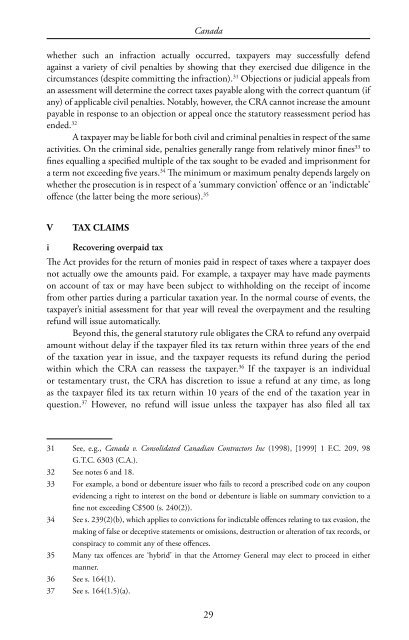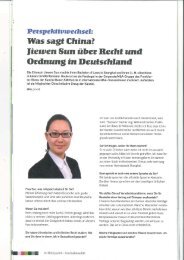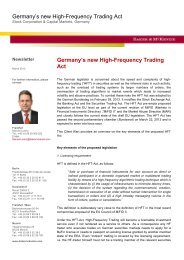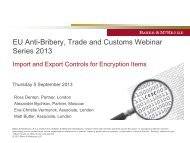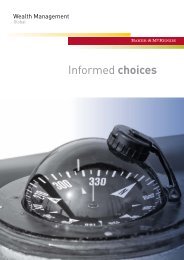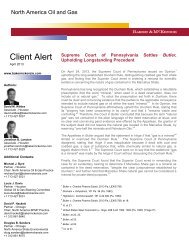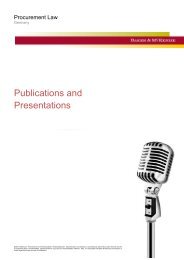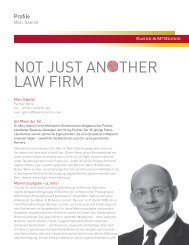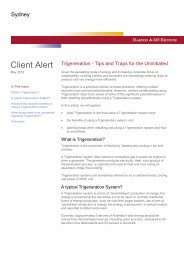Read publication - Baker & McKenzie
Read publication - Baker & McKenzie
Read publication - Baker & McKenzie
You also want an ePaper? Increase the reach of your titles
YUMPU automatically turns print PDFs into web optimized ePapers that Google loves.
Canada<br />
whether such an infraction actually occurred, taxpayers may successfully defend<br />
against a variety of civil penalties by showing that they exercised due diligence in the<br />
circumstances (despite committing the infraction). 31 Objections or judicial appeals from<br />
an assessment will determine the correct taxes payable along with the correct quantum (if<br />
any) of applicable civil penalties. Notably, however, the CRA cannot increase the amount<br />
payable in response to an objection or appeal once the statutory reassessment period has<br />
ended. 32 A taxpayer may be liable for both civil and criminal penalties in respect of the same<br />
activities. On the criminal side, penalties generally range from relatively minor fines 33 to<br />
fines equalling a specified multiple of the tax sought to be evaded and imprisonment for<br />
a term not exceeding five years. 34 The minimum or maximum penalty depends largely on<br />
whether the prosecution is in respect of a ‘summary conviction’ offence or an ‘indictable’<br />
offence (the latter being the more serious). 35<br />
V<br />
TAX CLAIMS<br />
i Recovering overpaid tax<br />
The Act provides for the return of monies paid in respect of taxes where a taxpayer does<br />
not actually owe the amounts paid. For example, a taxpayer may have made payments<br />
on account of tax or may have been subject to withholding on the receipt of income<br />
from other parties during a particular taxation year. In the normal course of events, the<br />
taxpayer’s initial assessment for that year will reveal the overpayment and the resulting<br />
refund will issue automatically.<br />
Beyond this, the general statutory rule obligates the CRA to refund any overpaid<br />
amount without delay if the taxpayer filed its tax return within three years of the end<br />
of the taxation year in issue, and the taxpayer requests its refund during the period<br />
within which the CRA can reassess the taxpayer. 36 If the taxpayer is an individual<br />
or testamentary trust, the CRA has discretion to issue a refund at any time, as long<br />
as the taxpayer filed its tax return within 10 years of the end of the taxation year in<br />
question. 37 However, no refund will issue unless the taxpayer has also filed all tax<br />
31 See, e.g., Canada v. Consolidated Canadian Contractors Inc (1998), [1999] 1 F.C. 209, 98<br />
G.T.C. 6303 (C.A.).<br />
32 See notes 6 and 18.<br />
33 For example, a bond or debenture issuer who fails to record a prescribed code on any coupon<br />
evidencing a right to interest on the bond or debenture is liable on summary conviction to a<br />
fine not exceeding C$500 (s. 240(2)).<br />
34 See s. 239(2)(b), which applies to convictions for indictable offences relating to tax evasion, the<br />
making of false or deceptive statements or omissions, destruction or alteration of tax records, or<br />
conspiracy to commit any of these offences.<br />
35 Many tax offences are ‘hybrid’ in that the Attorney General may elect to proceed in either<br />
manner.<br />
36 See s. 164(1).<br />
37 See s. 164(1.5)(a).<br />
29


